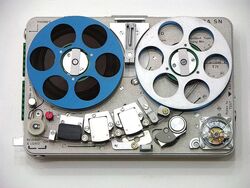| Hedda Hopper's Dictation Machine | |
|---|---|

| |
| "I wasn't allowed to speak while my husband was alive, and since he's gone no one has been able to shut me up."
- Hedda Hopper | |
|
Origin |
Hedda Hopper |
|
Type |
Dictation Machine |
|
Effects |
Belief Implementation |
|
Downsides |
Extreme Single-Mindedness |
|
Collected by |
|
|
Section |
|
|
Aisle |
889911-5960 |
|
Shelf |
720399-3217-636 |
|
Date of Collection |
May 15, 2015 |
| [Source] | |
Origin[]
Hedda Hopper (1885-1966) was an American actress and gossip columnist. Born Elda Furry, Hopper premiered in silent pictures in 1915, and appeared in over 120 silent and sound movies. Unable to find work by her fifties, she was hired by Cissy Patterson, head of the Washington Times-Herald, to write an article on the movie industry in 1935. This launched her career as a journalist, and with the help of MGM, in 1938 The L.A. Times had given Hopper her own column, entitled Hedda Hopper's Hollywood.
Hopper quickly established herself as one of the most hated women in Hollywood, alongside fellow gossip columnist and rival Louisa Parsons. Both women were used by studio execs to keep actors in line through moral turpitude clauses, and both were bought off when studios wanted to keep scandals quiet. Hopper, however, branded herself with elegance and style, unlike the more demure Parsons, and touted extravagance as a symbol of her standing as Hollywood royalty.
Hopper called up contacts from her time in the movies, used her maternal image to inspire trust in others, or simply (and infamously) dropped in on on her targets in the middle of the night to catch them off guard, all in order to fill her column. Her ability to dig up dirt in the film industry, along with her distinctive personality, made her extremely popular with the non-Hollywood elite public, and at the height of her career had over 35 million readers. Her accusations resulted in many careers being ruined or tarnished, such as Charlie Chaplin, Katherine Hepburn, Spencer Tracey, Marilyn Monroe, and Ingrid Bergman, and also dropped names of the Hollywood Blacklist during McCarthyism.
Effects[]
Unbeknownst to the Hollywood elite she rubbed shoulders with, Hopper used the ostentatious hats for which she was known as a place to hide a dictation machine within, allowing her to eavesdrop conversations with perfect recall. However, it became imbued with her control over gossip and scandal, and now will implant statements recorded into the receiver into the minds of anyone within close range.
Victims of the artifact's effects will believe the statements with more fervor the longer the machine remains active, until it is the only thing that they are able to focus on.
